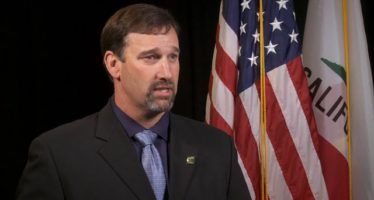U.S. tax policy undercuts CA water conservation push
 Even before the current marathon drought, turf replacement subsidies have long been touted by the state government as a powerful way to get California homeowners to stop having water-guzzling lawns. But the federal government sees these subsidies as taxable income. This is from a recent Los Angeles Times report:
Even before the current marathon drought, turf replacement subsidies have long been touted by the state government as a powerful way to get California homeowners to stop having water-guzzling lawns. But the federal government sees these subsidies as taxable income. This is from a recent Los Angeles Times report:
Southern Californians who received cash rebates for replacing their lawns with drought-tolerant landscaping will soon get a federal tax form in the mail reporting the amount, but water officials said Thursday it is still not clear whether the reimbursement will be taxable.
Officials from the Metropolitan Water District of Southern California — which funded a $340 million incentive program — say they are sending 1099 forms to turf rebate recipients of $600 or more and leaving reporting up to participants and their tax advisers.
“We’re doing what we believe is our obligation, which is sending the 1099s,” said Deven Upadhyay, an MWD manager. Recipients “would have to work with their own tax adviser in terms of the way that they might characterize it in terms of the way they file their own taxes.”
This would affect most of those who received rebates, Upadhyay said, though he did not give an exact number. The average residential rebate totals about $3,000, according to MWD data. In some cases, residents received rebates of more than $70,000.
MWD spokesman Bob Muir said the agency believes the rebates should be “tax-free.”
California provides a tax exemption for turf removal rebates, but the federal tax code provides an exemption only for rebates related to energy efficiency, officials said.
‘Strategic’ water conservation promoted
The peculiarity here is that the federal government has been formally committed to promoting water conservation for decades, since long before warnings about the West’s expected “mega-drought” began. This is from a 1998 U.S. Environmental Protection Agency overview of federal conservation policy:
The Safe Drinking Water Act (SDWA, 42 U.S.C. 300j-15), as amended in 1996, requires the United States Environmental Protection Agency (EPA) to publish guidelines for use by water utilities in preparing a water conservation plan. …
These Water Conservation Plan Guidelines are addressed to water system planners but use of the Guidelines is not required by federal law or regulation. States decide whether or not to require water systems to file conservation plans consistent with these or any other guidelines. …
The infrastructure needs of the nation’s water systems are great. Strategic use of water conservation can help extend the value and life of infrastructure assets used in both water supply and wastewater treatment, while also extending the beneficial investment of public funds through the SRF and other programs.
L.A. controller calls program a ‘gimmick’
But there’s another twist to this story. The MWD program that many L.A. and water officials want to be federal tax-free doesn’t appear to be very effective, according to a Los Angeles city audit released in November:
Los Angeles’ turf rebate program saved less water per dollar spent than other Department of Water and Power conservation programs, an audit released by the city controller said Friday.
Auditors found that money spent for rebates on items such as high-efficiency appliances yielded a water savings almost five times higher than turf replacement. …
City Controller Ron Galperin called on the water provider to focus its conservation programs in order to achieve more sustained and cost-effective water savings. …
In fiscal year 2014-15, the DWP spent $40.2 million on customer incentive and rebate programs, Galperin’s office said. Nearly $17.8 million of that went to turf rebates. Each dollar invested in turf rebates is expected to save 350 gallons of water over the estimated 10-year “life expectancy” of residential turf replacement, the audit said.
In comparison, the department spent $14.9 million on rebates for high-efficiency appliances and fixtures. Those rebates yield a per-dollar savings of more than 1,700 gallons of water over their estimated lifetimes of up to 19 years, Galperin’s office said.
The turf rebate program “had value as a gimmick that … probably spurred a heightened awareness,” Galperin said at a news conference, adding: “It’s the job of my office to look at return on investment.”
That’s from a Nov. 20 Times story.
Chris Reed
Chris Reed is a regular contributor to Cal Watchdog. Reed is an editorial writer for U-T San Diego. Before joining the U-T in July 2005, he was the opinion-page columns editor and wrote the featured weekly Unspin column for The Orange County Register. Reed was on the national board of the Association of Opinion Page Editors from 2003-2005. From 2000 to 2005, Reed made more than 100 appearances as a featured news analyst on Los Angeles-area National Public Radio affiliate KPCC-FM. From 1990 to 1998, Reed was an editor, metro columnist and film critic at the Inland Valley Daily Bulletin in Ontario. Reed has a political science degree from the University of Hawaii (Hilo campus), where he edited the student newspaper, the Vulcan News, his senior year. He is on Twitter: @chrisreed99.
Related Articles
England for Lt. Gov.?
Steven Greenhut: It’s more than a rumor — California conservatives are actively recruiting a write-in candidate for lieutenant governor in
School bond problems go far beyond LAUSD purchase of iPads
Gov. Jerry Brown’s skepticism about state assistance for local school districts’ construction projects appears to be primarily based on an
Will other GOPers who backed ‘cap and trade’ face fallout?
Chad Mayes of Yucca Valley is out as Assembly Republican leader, replaced last week by Assemblyman Brian Dahle of Bieber.




